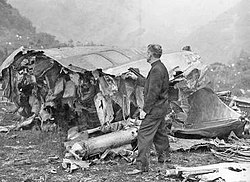United Air Lines Flight 615
 The wreckage and remains of the accident aircraft. | |
| Accident | |
|---|---|
| Date | August 24, 1951 |
| Summary | Controlled flight into terrain |
| Site | Near Decoto, California, United States |
| Aircraft | |
 A UAL DC-6 similar to the accident aircraft | |
| Aircraft type | Douglas DC-6B |
| Aircraft name | Mainliner Omaha |
| Operator | United Airlines |
| Registration | N37550 |
| Flight origin | Boston |
| 1st stopover | Hartford, Connecticut |
| 2nd stopover | Cleveland, Ohio |
| 3rd stopover | Chicago |
| Last stopover | Oakland, California |
| Destination | San Francisco |
| Occupants | 50 |
| Passengers | 44 |
| Crew | 6 |
| Fatalities | 50 |
| Survivors | 0 |
United Air Lines Flight 615 was a US transcontinental east–west airline service from Boston to Hartford, Cleveland, Chicago, Oakland and San Francisco. On August 24, 1951, the Douglas DC-6 with registration N37550[1] operating the service, crashed on approach to Oakland, causing the death of all 44 passengers and 6 crew members on board.[2]
The flight departed Chicago at 10:59 p.m. CST en route to Oakland. At around 4:16 a.m., the plane was approaching Oakland. At this time, the pilot, Marion W. Hedden of Los Altos, had talked with the control tower of the Civil Aeronautics Administration at the airport preparing for his landing, and had mentioned no trouble. At 4:25 a.m. Flight 615 was cleared for the straight-in approach into Oakland.
This approach clearance was the last radio transmission with the flight. The plane crashed into mountainous terrain 15 miles (24 km) southeast of Oakland, careening into Tolman Peak and over its knoll, scattering on the downslope and into Dry Gulch Canyon below in a fiery explosion. All 50 persons on board perished.
After an investigation, it was determined that the pilot ignored the prescribed instrument landing procedures. The pilot instead relied on visual reference, using the copilot's automatic direction finder (ADF). The ADF threw the plane three miles (4.8 km) off course and below the prescribed altitude of 3,500 feet (1,100 m).
See also
[edit]References
[edit]- ^ "FAA Registry (N37550)". Federal Aviation Administration.
- ^ "CAB Accident Investigation Report, SA-239 File No. 1-0058". 24 August 1951. Retrieved 2015-06-10.
External links
[edit]- Accident description at the Aviation Safety Network
- Report - Civil Aeronautics Board - PDF
- Union City History - Crash of Flight 615 - includes period photographs and a chart excerpt from CAB report
- Wreckchasing.com - United Airlines Flight 615 - includes hiking directions to the crash site
- Check-Six.com - The Crash of United Airline Flight #615 - includes full crew and passenger list
- Mishalov.com - The Crash of a DC-6B in Alameda County, California - includes current-day photographs of crash site and topographic map
- Accident scene photo[usurped] from Airdisaster.com
- Airliner accidents and incidents involving controlled flight into terrain
- Aviation accidents and incidents in the United States in 1951
- History of Alameda County, California
- United Airlines accidents and incidents
- Accidents and incidents involving the Douglas DC-6
- Airliner accidents and incidents in California
- Union City, California
- 1951 in California
- August 1951 events in the United States
